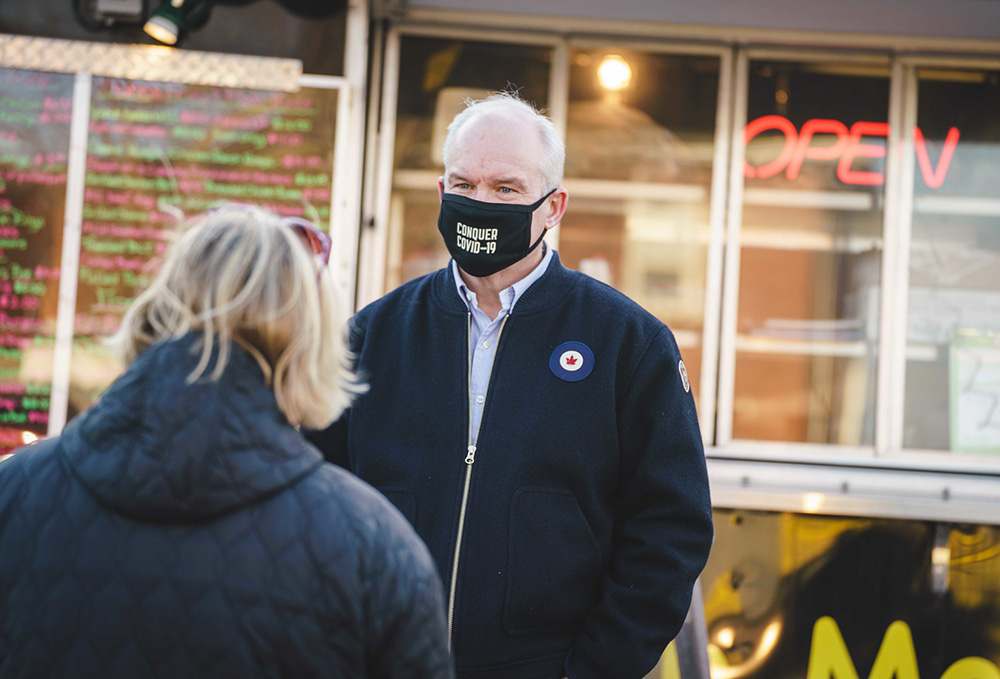“Data scientists,” once known as garden-variety pollsters, have pronounced that the first days of Election 2021 have seen the Liberal lead in the polls fizzle.
The momentum, they say, belonged to the Conservatives and the NDP. There was even a faint whiff of a potential upset in the air.
The Liberals amplified that sense with early gaffes: a Twitter caution the party had “manipulated media” and distorted Conservative Leader Erin O’Toole’s stand on two-tier national health care and Liberal Leader Justin Trudeau’s offhand comment that he didn’t think much about monetary policy. (The Conservatives were handed a rebuke when Twitter pulled their absurd Willy Wonka attack on Trudeau for copyright violation.)
Nik Nanos, with the full weight of the best reputation in the business behind him, has declared that this election is now a horse race. At best, the Liberals might eke out another minority.
Other pollsters have said that Trudeau’s chance of forming a majority government is just 10 per cent. How long can it be before someone publishes a poll showing O’Toole in the lead? Well, Angus Reid Institute effectively did that by releasing data showing that the Liberals and the Conservatives are in a statistical tie.
A few things should be kept in mind before writing Trudeau’s obit on the basis of a sampling of public opinion a little over a week into a race that has 26 days to go.
One of them is that while pundits and pollsters are fixated on every word the leaders say, regular Canadians won’t be tuning in until the cottage is closed up, the kids are back in school and the lawnmower is gassed up for the last time.
Another is that the Liberals have yet to release their platform. Things will start to get serious after that happens, and once the leaders’ debates takes place on Sept. 8 and 9.
As everyone knows, polls are out of date the moment they are published. They are snapshots in time, and determined by methodology, sample size, demographics, technology and questions asked. Not all polls are created equal.
Sometimes the polls are dead on. Ekos, for example, accurately predicted the surprise NDP majority victory in Alberta in 2015.
Other times, they have been wrong. Pollsters were widely predicting that BC NDP Leader Adrian Dix would emerge as premier in the 2015 provincial election. Liberal Christy Clark defied the polls and kept her job.
Pollsters almost entirely missed predicting Boris Johnson’s majority victory in the U.K.
The most recent example of dubious polling came in the recent Nova Scotia election. “Polls had us, two months ago, 28 points behind, saying we had no chance of winning,” newly elected Nova Scotia Conservative Premier Tim Houston said. “We have completely blown that to smithereens.”
Another cautionary tale about polling is provided by the 2015 federal election when Trudeau, then leader of the third party in Parliament, won a majority government. That year the writ was dropped on Aug. 2 and the vote took place on Oct. 19.
Although the Liberals got off to a good start, their polling numbers languished. As late as mid-September, the Liberals, Conservatives and NDP were virtually tied.
The leadership debates proved pivotal. After a strong showing, Trudeau began to shake off the knock against him that he was “just not ready” to be prime minister.
And then the volatility that lurks in every campaign set in. The NDP vote collapsed in Quebec. Stephen Harper and the Conservatives were tainted by revelations from the trial of Sen. Mike Duffy. Then Harper’s perceived lackadaisical response to the Syrian refugee crisis began to bite. Suddenly, Trudeau looked like he might be ready after all.
It is tempting to think that O’Toole is in a similar position to the one Trudeau occupied in 2015 — an unknown leadership commodity seeking the top job. Like Harper, who had the Syrian refugee crisis to deal with, Trudeau is trying to run his campaign during a pandemic, with chaos unfolding in Afghanistan and a sizeable portion of Canadians unhappy with the election call.
But the big difference is that Erin O’Toole is no Justin Trudeau. Trudeau came with an unchallenged Liberal pedigree, the son of Pierre Trudeau. O’Toole is more of an opportunistic pragmatist. A political chameleon.
Trudeau came into his leadership bid with instant name recognition, a vitally important factor in politics, while O’Toole is comparatively unknown to Canadians.
It is not just that 59 per cent of Canadians in a recent Angus Reid Institute survey have an unfavourable impression of the new Conservative leader.
It is that O’Toole has reversed key elements of the party’s social conservatism and policy platform in search of relevance in voter-rich urban centres.
The problem is that O’Toole doesn’t know if he can persuade anyone of his newfound progressivism, let alone have his own base stick with him. He is all but unrecognizable as a Harper Conservative, which, ironically, is how he presented himself to win the party leadership.
When O’Toole was a member of the Harper government, Ottawa brought in Bill C-377, imposing onerous reporting duties on unions. It was widely panned by organized labour. But in Harperland, unions were the enemy. Even after losing the 2015 election, the Conservatives tried to block Trudeau’s efforts to rescind this anti-union legislation.
Now O’Toole is promising to put workers on the corporate boards of directors of federally regulated corporations. How will the base of a party weaned on Republican style anti-union legislation feel about that?
It is already well known how labour feels about it. Unifor, Canada’s largest private sector union with over 310,000 members, has already begun its campaign against O’Toole, warning voters not to trust him.
Harper refused to regulate the energy sector as prime minister, and O’Toole signed on as a loyal member of a government that vehemently opposed a carbon tax.
Harper called it a revenue grab that wouldn’t work. His successor, Andrew Scheer, said he would “never” agree to a carbon tax. The Conservatives supported the three provincial governments that brought a legal challenge against the federal tax. Even after the Supreme Court of Canada ruled that the tax was constitutional, Alberta Premier Jason Kenney said he would continue to fight it.
O’Toole broke with his party and all of his predecessors when he announced his climate plan last April, which includes a carbon tax. What will the party’s base make of that about-face?
In fact, what will the base think of O’Toole’s entire suite of climate solutions, given that just a few months ago the party was asked in convention to endorse this statement: “We recognize that climate change is real. The Conservative party is ready to act.”
Fifty-four per cent of the delegates voted against the motion.
All of O’Toole’s predecessors in both the Conservative Party of Canada and its earlier iterations were ardent free-traders happy to let the market sort out economic matters. Now O’Toole is pitching a “Canada First” policy aimed at self-sufficiency. Though it aligns nicely with Trump’s America First policy, how does that square with the party’s free-trade roots?
In 2015, the Harper government fought the expansion of safe-injection sites, passing legislation tightening the rules for further expansion and making it tougher to get an exemption. Drug use was a law-and-order issue for the Conservatives back then, not a public health measure.
Now O’Toole is promising $325 million for 1,000 residential beds and 50 new recovery centres. Will the base buy it?
And finally, the issue that dare not speak its name, abortion. There is a strong, active and uncompromising faction in the Conservative party that is devotedly “pro-life.” Harper strong-armed this group into effective silence, his successor Scheer was one of them. “I am personally pro-life,” he said as leader, while vowing not to reopen the divisive issue that is still so important in several ridings in Alberta and rural Ontario.
O’Toole reversed Scheer’s words, asserting “I’m pro-choice.”
That will not sit well with social conservatives in both the party and the caucus, particularly when Leslyn Lewis wins her safe seat in Haldimand-Norfolk and becomes a strong anti-abortion voice. Nor will O’Toole be embraced by the organized anti-abortion groups in Canada, like RightNow, the Campaign Life Coalition and the Canadian Centre for Bio-Ethical Reform.
When Conservatives had to choose between Peter MacKay and Erin O’Toole to replace Scheer, the Red Tory threat was thought to be MacKay.
The party might just have had it backwards. ![]()
Read more: Politics, Election 2021
















Tyee Commenting Guidelines
Comments that violate guidelines risk being deleted, and violations may result in a temporary or permanent user ban. Maintain the spirit of good conversation to stay in the discussion.
*Please note The Tyee is not a forum for spreading misinformation about COVID-19, denying its existence or minimizing its risk to public health.
Do:
Do not: